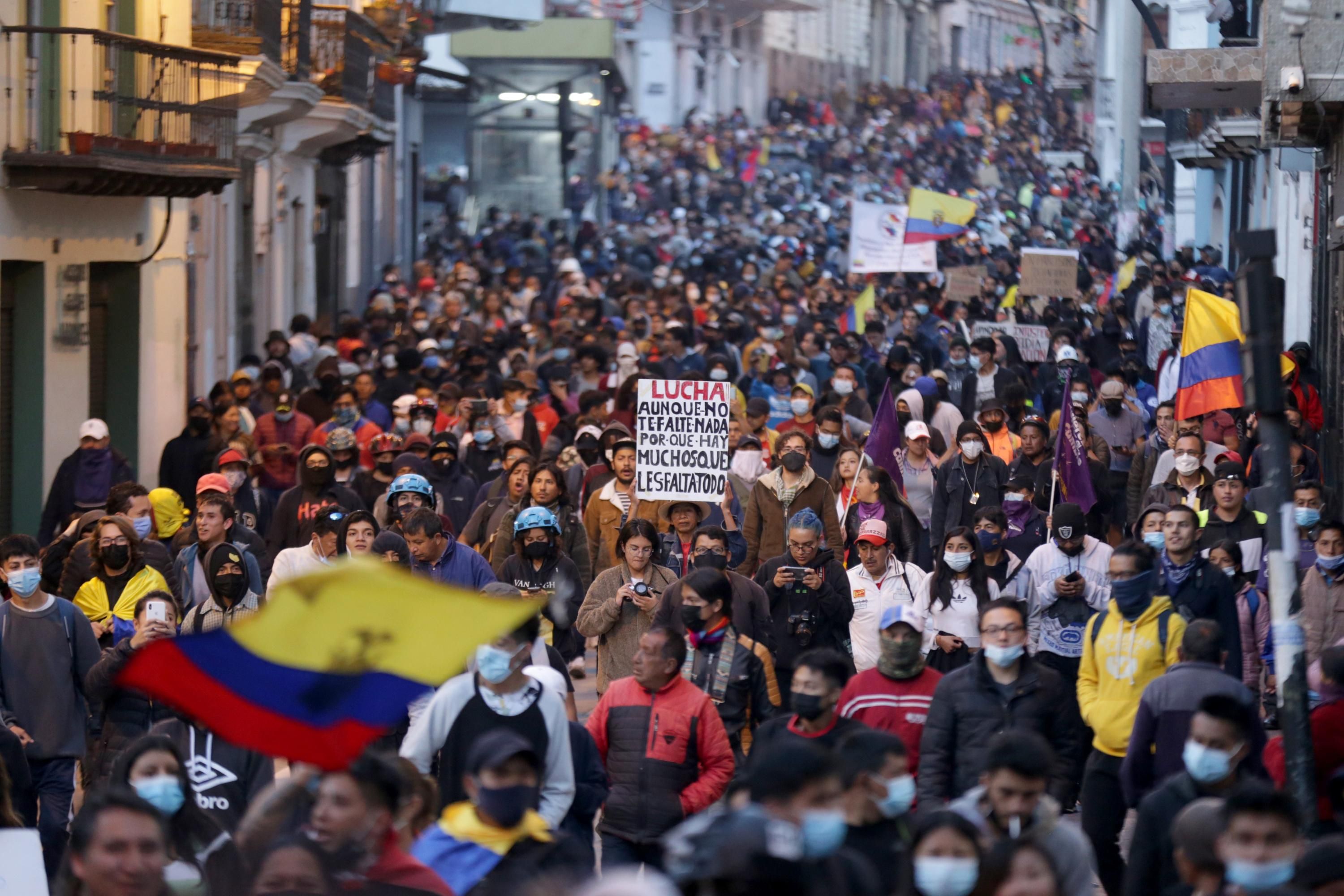
On Monday, protests erupted throughout Ecuador. The demonstrations, coordinated by the CONAIE, or Conderation of Indigenous Nationalities of Ecuador, accompanied by student groups and labor unions, resisted a planned hike in fuel prices.
Without mounting public national, regional, and international pressure, the Lasso government will not be pushed to make any concessions to the Ecuadorian people.
The CONAIE is represented by the environmentalist indigenous Pachakutik Party in the National Assembly in Quito, the second-most powerful party on the left.
The group also put forward 10 demands to the center-right government of President Guillermo Lasso. The demands include a halt to the expansion of oil and mining exploration, as well as a freeze on the price of petroleum and agricultural products.
Protests were first concentrated in the historical downtown of Quito, disrupting businesses, infrastructure, and tourism. I was personally in the area when the protests occurred, forcing me to escape the police's use of tear gas to disperse the crowd.
In the coastal countryside and in the Amazon, protesters have also targeted oil and mining towns, as well as agricultural centers, allegedly leading to the deaths of two mine workers and one protester in the southern highlands.
Some cities have been paralyzed, as protesters have blocked major highways. The Lasso government has implemented swift measures, instructing the use of tear gas against protesters, while also conducting a series of broad arrests and targeted raids.
The leader of the CONAIE Leonidas Iza was arrested and put on trial for sabotage, though he was promptly released as a result of public pressure. Local independent journalists have also been arrested and targeted by the police and military.
These clashes are not new. They have come periodically since 1997 and have been most potent against conservative or neoliberal governments proposing price and tax increases to reduce Ecuador's national debt.
Between 1997 and 2005, the protests deposed three Presidents in Ecuador, showcasing the strength of left-wing activism in Ecuador.
The protests in the late 1990s and early 2000s also helped usher in three consecutive mandates by President Rafael Correa, who championed policies of the populist left and was part of the Pink Tide movement in South America.
Correa's predecessors in the Pink Tide included Lula in Brazil, Evo Morales in Bolivia, Ollanta Humala in Peru, Hugo Chávez in Venezuela, Michelle Bachelet in Chile, and the Kirschners in Argentina.
Correa's tenure was characterized by an expansion of public education, transportation, healthcare, and a vast redistribution of wealth between the rich and poor strata of Ecuador.
Even after 10 years, Correa maintains a high approval rating, oscillating between 55 and 65 percent according to independent polling in Ecuador.
During Correa's tenure, the CONAIE and other indigenous, student, and labor groups played a large role in Ecuadorian politics, being assigned key ministerial positions and holding the balance of power in Congress.
Yet, in 2017, as Correa decided not to run again—citing family reasons—Ecuadorian politics took a hard turn to the right. At the ballot box, Ecuadorians chose to elect Lenin Moreno, who, despite running with Correa's party, governed as a center-right President.
Then-President Moreno focused his tenure on reducing the debt and the deficit, expanding small business, and welcoming international investment and tourism. These priorities came to the detriment of the quality of public services, which sharply decreased as a result of austerity measures.
Such austerity measures, including price hikes for fuel and other essential goods and services, led to mass protests in 2019, where left-wing activists once again took to the streets hoping to reverse the measures and depose Moreno.
The protests were highly violent, leading to the deaths of between 8 and 23 protesters at the hands of state security forces.
Moreno, due to public pressure, canceled the planned price hikes and decided not to run for reelection in 2021. Since then, Moreno's successor, Guillermo Lasso, has continued many of the austerity measures put in place by his successor. A price increase on fuel has once again been put forward, leading to the ongoing protests.
One may question why the two center-right presidents were elected given the popularity of former left-wing President Correa and the tremendous backlash to austerity measures, but the Ecuadorian left is highly divided.
While the center and the right, including Ecuador's financial, political, and media elites, were largely united behind former President Moreno and current President Lasso, the left is split up between a variety of political parties and interest groups, all of which have different policy preferences and priorities.
Like in 2019, these protests will be a test of the determination of the current government for austerity measures and neoliberal policies.
The Lasso government's aggressive response, claiming that they will "not allow the country to be paralyzed," and alluding to the possible use of violence if necessary, may end up uniting the left further and pushing it towards more violent resistance. Unfortunately, the lack of international attention to the protest and Ecuador's contentious political past, present, and future may give the Lasso more leeway in its response.
The protesters should focus their attention on gaining international coverage and recognition, in the hopes of containing the Lasso government's response. Then, a high death toll may be avoided, constitutional and human rights be respected, and the groups' demands be listened to.
Without mounting public national, regional, and international pressure, the Lasso government will not be pushed to make any concessions to the Ecuadorian people.
This content originally appeared on Common Dreams - Breaking News & Views for the Progressive Community and was authored by Joseph Bouchard.
Joseph Bouchard | Radio Free (2022-06-19T11:07:05+00:00) The Death of Neoliberalism in Ecuador. Retrieved from https://www.radiofree.org/2022/06/19/the-death-of-neoliberalism-in-ecuador/
Please log in to upload a file.
There are no updates yet.
Click the Upload button above to add an update.